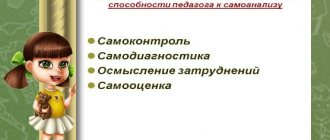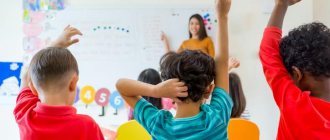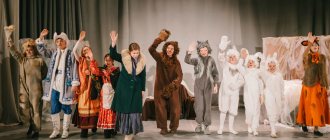Work program for preschool teachers on working with parents
Municipal budgetary preschool educational institution kindergarten No. 7, Yartsev, Smolensk region
APPROVED: I APPROVED: at the pedagogical council, Head of MBDOU kindergarten No. 7, protocol No. 1 of August 31, 2015. Order No. dated _________ ___________ THEM. Zakharova
PROGRAM
for working with parents
Compiled by: Grishakova S.V.
2015
Explanatory note
Today, global trends in changing the institution of the family, which are attracting increasing attention from scientists, are acquiring independent significance. Modern science is unanimous that without compromising the development of the child’s personality, it is impossible to abandon family education ,
just as a family cannot raise a child in isolation from other educational institutions
.
All of them are called upon to promote the maximum development of the child, therefore they are interested in combining their efforts, taking into account those aspects of educational activity in the area in which each of them has certain advantages.
The lack of educational programs for parents on television and radio, the decline in circulation of specialized scientific and popular publications has created an information vacuum in which the majority of families raising preschool children find themselves.
In this situation, as practice shows, the kindergarten teacher often becomes the only source of pedagogical knowledge for parents
.
Creating a team of like-minded people in a preschool institution: parents and teachers focused on the personal growth of the child - allows you to successfully solve children's problems and prepare with optimism for the future achievements of a preschool graduate at school.
Purpose of the work program
— creating the necessary conditions for increasing professional competence and responsible relationships between teachers and families of students (the ability to resolve different types of socio-pedagogical situations related to raising a child); ensuring the right of parents to respect and understanding, to participate in the life of the kindergarten.
Tasks
work program
:
- to study the attitudes of teachers and parents to various issues
education,
education, development of children, conditions for organizing various activities in kindergarten and family;
- improve the professional level of teachers through
the use of creative forms of activation and comprehension of one’s teaching activities;
- create conditions in kindergarten for a diverse range of
content and forms of cooperation that contribute to the development of constructive interaction between teachers and parents with children;
- establish partnerships with families
pupils and involve them in participation in joint events with teachers organized at the preschool educational institution
Basic principles
Continuity of coordinated actions.
The main motive for interaction between parents and teachers (according to V. A. Sukhomlinsky)
is “... how childhood passed, who led the child by the hand during childhood, what entered his mind and heart from the world around him - this decisively determines what kind of person today’s child will become.” Mutual understanding between family and kindergarten - this single space, objective reality - will take place with the agreement of educational goals and objectives, the positions of both parties, “built on the principle of unity, respect and requirements for the child, distribution of duties and responsibilities.
Humane approach
to building relationships between families and preschool educational institutions. The most essential principles in the relationship between the preschool educational institution and the family are humanity, tolerance, i.e. recognition of dignity, personal freedom, tolerance for the opinions of others; kind, attentive attitude of all participants in the interaction.
Openness.
New social changes in society require preschool teachers to be open to the student’s family
.
Such an approach will be effective if the proclaimed values are transformed into values that unite the social, intellectual, cultural experience of everyone living in a single pedagogical space: the children themselves, their family members, teachers
,
preschool specialists, and the social environment.
Individual approach
to every family. All families are different from each other. These differences depend on many factors: parental and human culture, family traditions, social status, health characteristics of family members, its composition, living conditions, educational qualifications, intrafamily relationships, the presence of animals in the family, preferred type of recreation and much more.
The effectiveness of forms of interaction between preschool educational institutions and families.
The realities of our time require changing the usual situation and building a system of interaction with parents.
The effectiveness of choosing forms depends on the ability to highlight the most important problems of the parties, draw attention to them, and look for an acceptable solution. The problem is stated by all those who enter the pedagogical space (
parents
,
educators
,
specialists, junior educators, psychologists, etc.). The forms are selected in accordance with regional, cultural-historical, socio-economic, socio-psychological conditions, family interests, preschool educational opportunities, etc. When choosing forms, the subjective factors of human life are comprehended and introduced into the educational process - communication, understanding, dialogue, compassion, empathy, meeting, love, i.e. everything that preserves life itself.
Feedback.
Partnership between parents and teachers requires well-established feedback.
It is necessary in order to study the opinions of parents on various issues of education and
the activities of preschool educational institutions
.
Parents want to know
whether
teachers take their opinion into account
,
whether they respond to their comments, suggestions, and advice. Educators, in turn, how parents react to suggestions and advice from educators, and whether they have counter-offers.
Stage-by-stage implementation.
The content of interaction between the preschool educational institution and the family is based on a stage-by-stage approach that identifies social aspects and integrates them with the spheres of individuality
Planned results:
individual methodological assistance from the teacher,
participants in the pedagogical process on the organization of various activities in kindergarten and family;
increasing the level of professional competence, self-esteem and developing a sense of professional competence among teachers;
increasing the level of parental competence, harmonizing family and parent-child relationships;
systematization of work with families and the elimination of ineffective forms of work and unnecessary overload in relations with parents.
Content section
There are methods that allow you to build relationships with parents.
The first one is “Let’s get to know each other!”
.
At this stage, parents’ introduction to the kindergarten, educational programs, and teaching staff opens up opportunities for them to work together .
The second stage is “Let's make friends!”
.
At this stage, parents are offered active methods of interaction: trainings, round tables
, game seminars.
The third stage is called “Let's find out together”
. At this stage, we can talk about the functioning of the parent-teaching community, directing its activities towards the development of the child.
Forms of work can be individual, group and family. Parent meetings on spiritual and moral topics, lectures for parents, open demonstrations of the educational process, question and answer evenings, joint educational events (exhibitions, competitions, parent seminars-interviews on a dialogue basis, visual works, information stands for parents, folding folders , exhibitions of children's works )
.
SAMPLE THEMATIC PLAN





